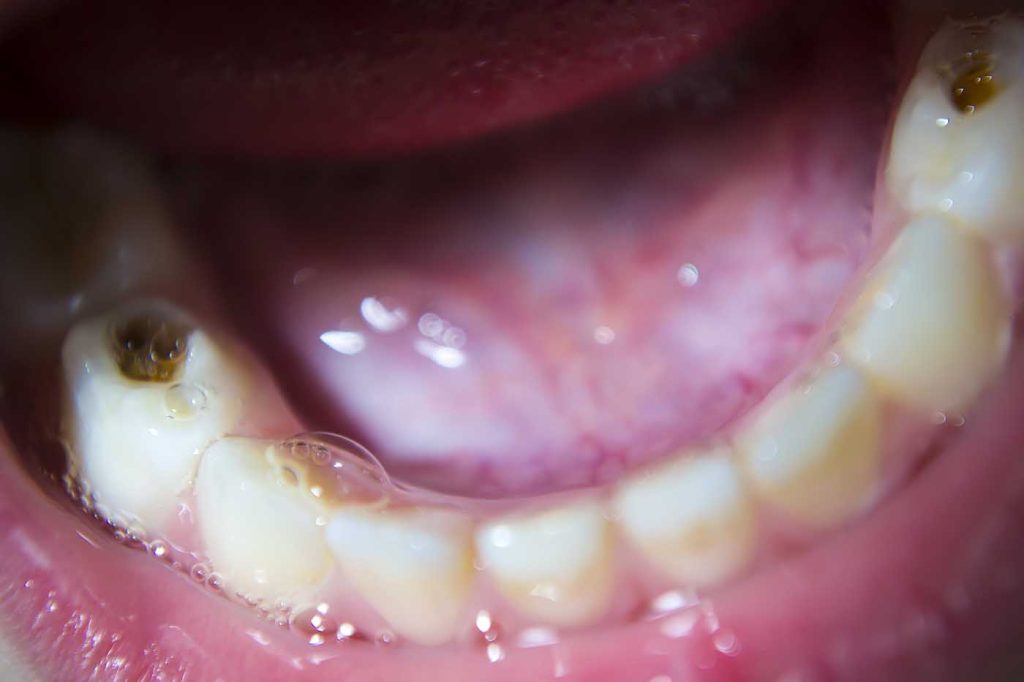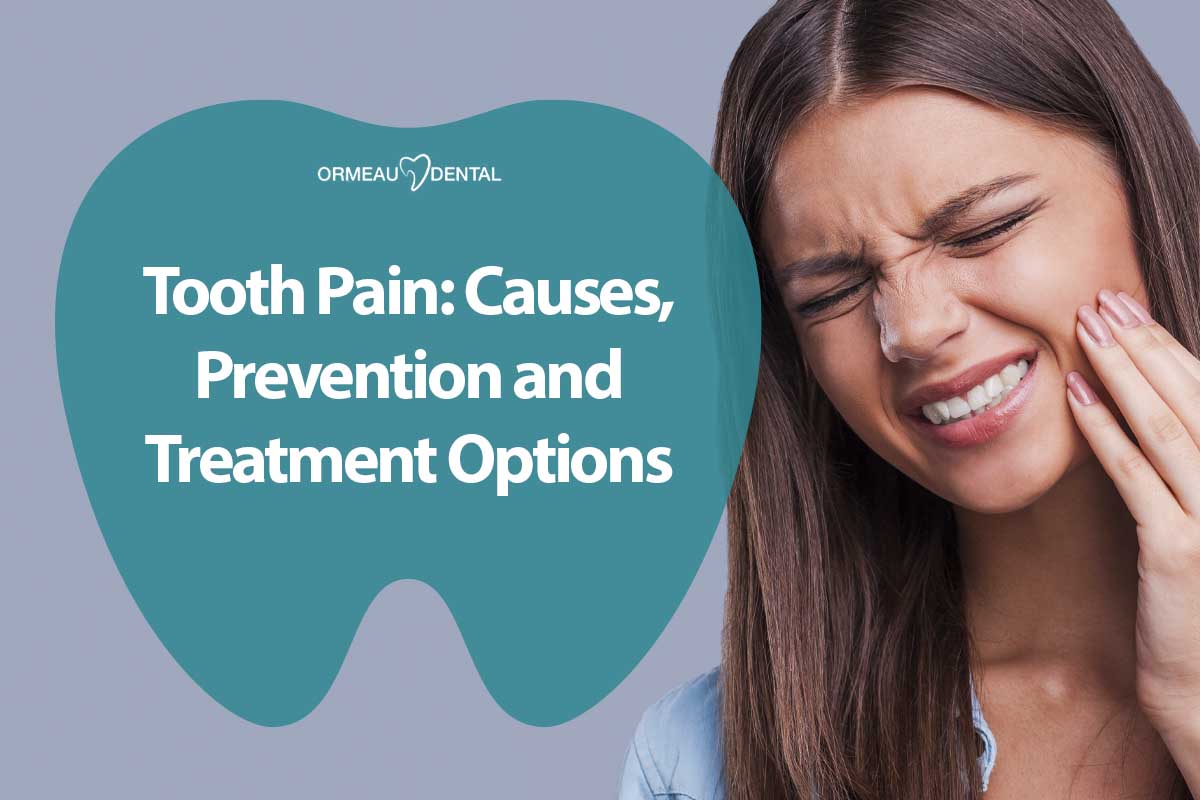Tooth pain can strike when you least expect it, leaving you seeking immediate relief.
Whether it’s a dull ache or a sharp, piercing sensation, understanding the causes and available treatment options can make all the difference.
Causes of Tooth Pain
Tooth pain is a common issue that often signals an underlying dental problem that needs professional attention.
Understanding tooth pain’s causes can help identify the right treatment and preventative measures.
Tooth Decay: The Primary Culprit
The most prevalent cause of tooth pain is tooth decay. This occurs when the tooth’s protective outer layer, or enamel, erodes away, exposing the more sensitive inner layers.
Exposure can lead to discomfort or sharp pain, particularly when eating sweet or cold foods.
Enamel erosion allows bacteria to penetrate deeper into the tooth, potentially leading to more severe dental issues if left untreated.
Gum Disease: A Stealthy Threat
Gum disease, or periodontal disease, starts with inflammation of the gums, which can cause pain around the teeth, especially during eating or brushing.
In its more advanced stages, gum disease can lead to the deterioration of the supporting bone structures and potential tooth loss, emphasizing the importance of early detection and treatment.
Tooth Abscess: An Infection-Driven Pain
An abscessed tooth results from an infection occurring at the tooth’s root or between the tooth and gum. This can create a pus pocket, leading to severe pain and swelling.
A tooth abscess is a dental emergency that requires prompt treatment to prevent the spread of the infection.
Impacted Wisdom Teeth: Painful Eruptions
Wisdom teeth that do not have enough room to emerge or develop normally can become impacted.
Impaction can lead to significant pain and swelling as the emerging tooth pushes against other teeth and structures in the mouth.
Tooth Fractures: Cracks Under Pressure
A fractured or cracked tooth can cause severe pain, particularly when pressure is applied to the tooth while biting.
Even small fractures can lead to big problems if bacteria infiltrate the crack, leading to infection or further decay.
Sensitive Teeth: The Pain of Exposure
Teeth become sensitive when their protective enamel is worn down, or gum recession occurs, exposing the underlying dentin. This can be caused by overbrushing, harsh teeth-whitening products, or naturally receding gums.
Sensitivity can lead to pain when teeth are exposed to hot, cold, or acidic foods.
Bruxism: Grinding Down Your Comfort
Bruxism, or teeth grinding, is not only a nervous habit but can also be an unconscious behaviour that occurs during sleep. Constant grinding can wear down the enamel and increase tooth sensitivity and pain.
Issues with Dental Work
Sometimes, the discomfort comes from dental work that hasn’t been done correctly.
Ill-fitting crowns, bridges, or other dental appliances can cause continuous pain and need adjusting by a professional.
Recognizing these causes of tooth pain is the first step toward effective treatment and relief.
If you’re experiencing any tooth pain, it’s crucial to consult with a dentist to determine the cause and appropriate treatment.
9 Tips for Preventing Tooth Pain

Maintaining oral health is key to avoiding tooth pain, and you can take several proactive steps to ensure your teeth remain healthy and free from discomfort.
Here’s a comprehensive guide to help prevent the onset of toothaches:
1) Regular Brushing and Flossing
The cornerstone of oral hygiene is regular brushing and flossing.
Brush your teeth at least twice a day using fluoride toothpaste, which helps to prevent tooth decay by strengthening tooth enamel.
Daily flossing is crucial for removing food particles and plaque from areas your toothbrush can’t reach, particularly between the teeth and the gum line.
2) Regular Dental Check-ups
Visiting your dentist at least twice yearly for professional dental cleans and oral examinations is essential.
These visits allow your dentist to detect and address potential issues early on, preventing them from escalating into more serious problems.
3) Maintain a Healthy Diet
Your diet plays a significant role in your dental health. Limiting sugary snacks and beverages is crucial as sugar fosters bacterial growth and accelerates tooth decay.
Instead, opt for a balanced diet that includes fruits, vegetables, lean proteins, and whole grains, which can all contribute to healthier teeth and gums.
4) Wear Protective Gear During Sports
Participating in sports increases the risk of dental injuries.
Wearing a mouthguard can provide significant protection, cushioning your teeth and gums from impact and preventing chips, cracks, and tooth loss.
5) Address Teeth Grinding and Clenching
If you grind or clench your teeth, discuss it with your dentist. These habits can wear down your enamel and cause significant tooth pain.
Dentists may recommend wearing a nightguard or suggest other strategies to protect your teeth during sleep.
6) Avoid Extreme Temperatures in Foods
If you experience tooth sensitivity, avoid foods and beverages that are extremely hot or cold. Such temperatures can trigger discomfort, particularly if you have receding gums or cavities.
7) Promptly Address Dental Issues
If you notice any signs of dental problems, such as cavities or loose fillings, it’s essential to seek treatment immediately.
Delaying care can lead to more severe pain and complicated therapies later.
8) Use Fluoridated Water
Drinking fluoridated water can help prevent tooth decay by replenishing lost mineral content in tooth enamel.
Most public water supplies are fluoridated, but it’s worth checking if yours is and considering an alternative source of fluoride if it’s not.
9) Consider Dental Sealants
For children, dental sealants might be recommended to protect the chewing surfaces of molars from decay.
Sealants provide a protective coating that prevents food and bacteria from getting stuck in the deep grooves of these teeth, significantly reducing the risk of cavities.
Following these nine preventative measures can significantly reduce the likelihood of experiencing tooth pain and maintain a healthy, pain-free smile.
Dental Treatment Options
Toothache can be an incredibly distressing experience, but modern dentistry offers a variety of treatment options designed to target and alleviate the underlying causes of dental pain.
Understanding these options can help you make informed decisions about your dental care and lead to a healthier, pain-free smile.
Fillings: Restoring Teeth with Precision
Dental Fillings are a common and effective treatment for tooth decay or minor fractures.
The dentist removes the decayed or damaged portion of the tooth and fills the cavity with a material such as composite resin, amalgam, or porcelain. This restoration helps to restore the tooth’s structure and prevent further decay or damage.
Root Canal Treatment: Addressing Deep Infection
A root canal may be necessary when a tooth’s nerve is infected or inflamed. This procedure involves removing the infected or damaged pulp inside the tooth, cleaning and disinfecting the inner chambers, and then filling and sealing the space to prevent further infection.
A root canal can save a tooth from extraction and alleviate severe pain.
Tooth Extraction: A Last Resort
Extraction may be necessary for severe decay, damage, or impacted teeth.
Removing the tooth can prevent the spread of infection and alleviate pain, making way for restorative solutions like bridges or implants.
Gum Treatment: Combating Gum Disease
For gum disease patients, treatments may range from deep cleaning—scaling and root planing—to more intensive surgical procedures.
These treatments eliminate infection, restore gum health, and prevent dental issues.
Desensitizing Treatments for Sensitive Teeth
Desensitizing toothpaste can offer relief for patients experiencing tooth sensitivity.
These toothpaste contain compounds that help block the transmission of pain signals from the tooth’s surface to the nerve, reducing sensitivity to temperature changes or other irritants.
Mouth Guards: Preventing Damage from Grinding
If tooth grinding (bruxism) is a problem, wearing a mouth guard at night can protect the teeth from excessive wear and alleviate pressure on the jaw. This preventive measure can significantly reduce the risk of developing tooth fractures and other related issues.
Corrective Dental Work: Enhancing Previous Treatments
Sometimes, previous dental work, such as crowns, bridges, or fillings, may need adjustment or replacement if they are causing discomfort or not functioning properly.
Corrective dental work can ensure that these restorations are comfortable and effective.
Over-the-Counter Pain Relief: Managing Symptoms
While over-the-counter pain relievers can temporarily relieve toothaches, they are not a long-term solution.
They can help manage symptoms while you await more definitive dental treatment.
Professional dental advice is essential for diagnosing the cause of toothache and determining the most effective treatment plan.
Seeking early treatment helps alleviate pain and contributes to long-term dental health and function.

In conclusion, tooth pain is a sign that you shouldn’t ignore.
It’s crucial to see a dentist, like the experienced professionals at Ormeau Dental, to determine the cause of the pain and get appropriate treatment.
Early intervention can prevent further complications and ensure the longevity of your oral health.
If you’re searching for a trusted dentist on the Gold Coast, look no further than Ormeau Dental. As a leading dental practice, we are proud to have satisfied patients from Upper Coomera, Ormeau, Pimpama, Yatala, Jacobs Well, and beyond. Our expert team offers a wide range of dental services to address discomfort and improve oral health. Whether you need a routine check-up or advanced treatment, connect with Ormeau Dentists today for exceptional care in a welcoming environment.
Don’t let toothache troubles hold you back! Contact our dentists in Ormeau today for expert care and a brighter, healthier smile.




